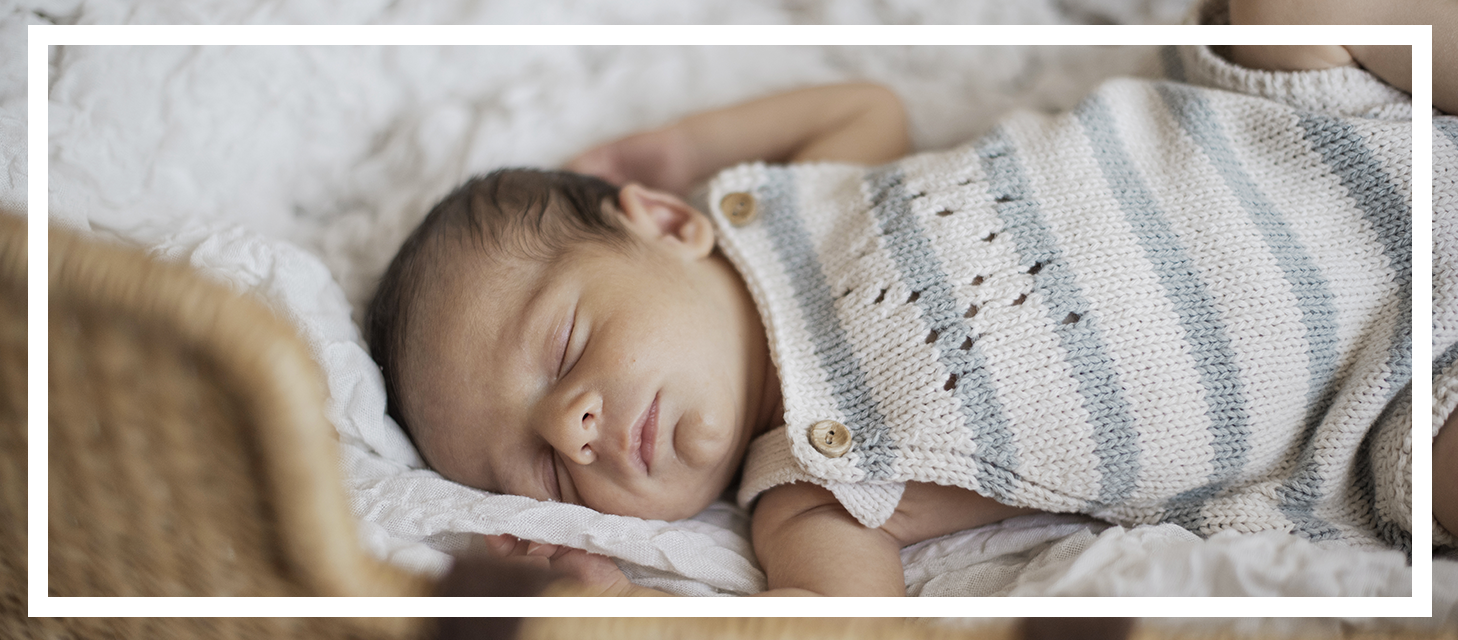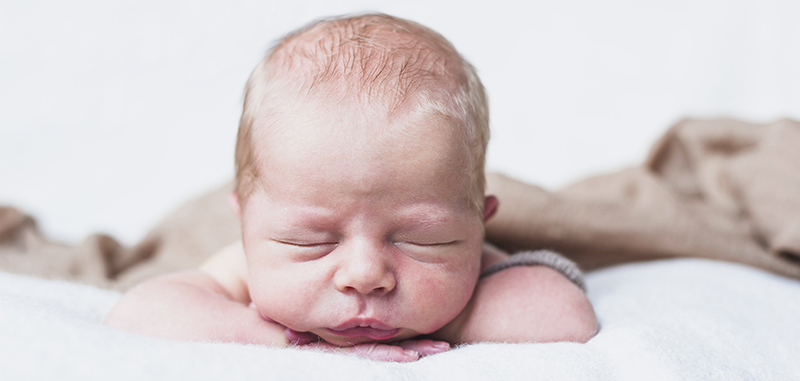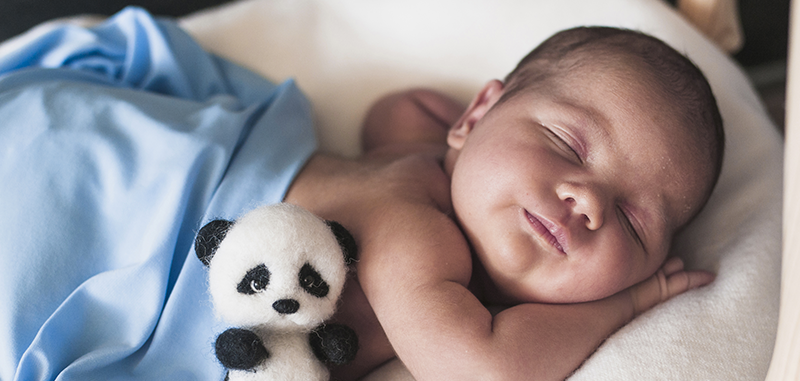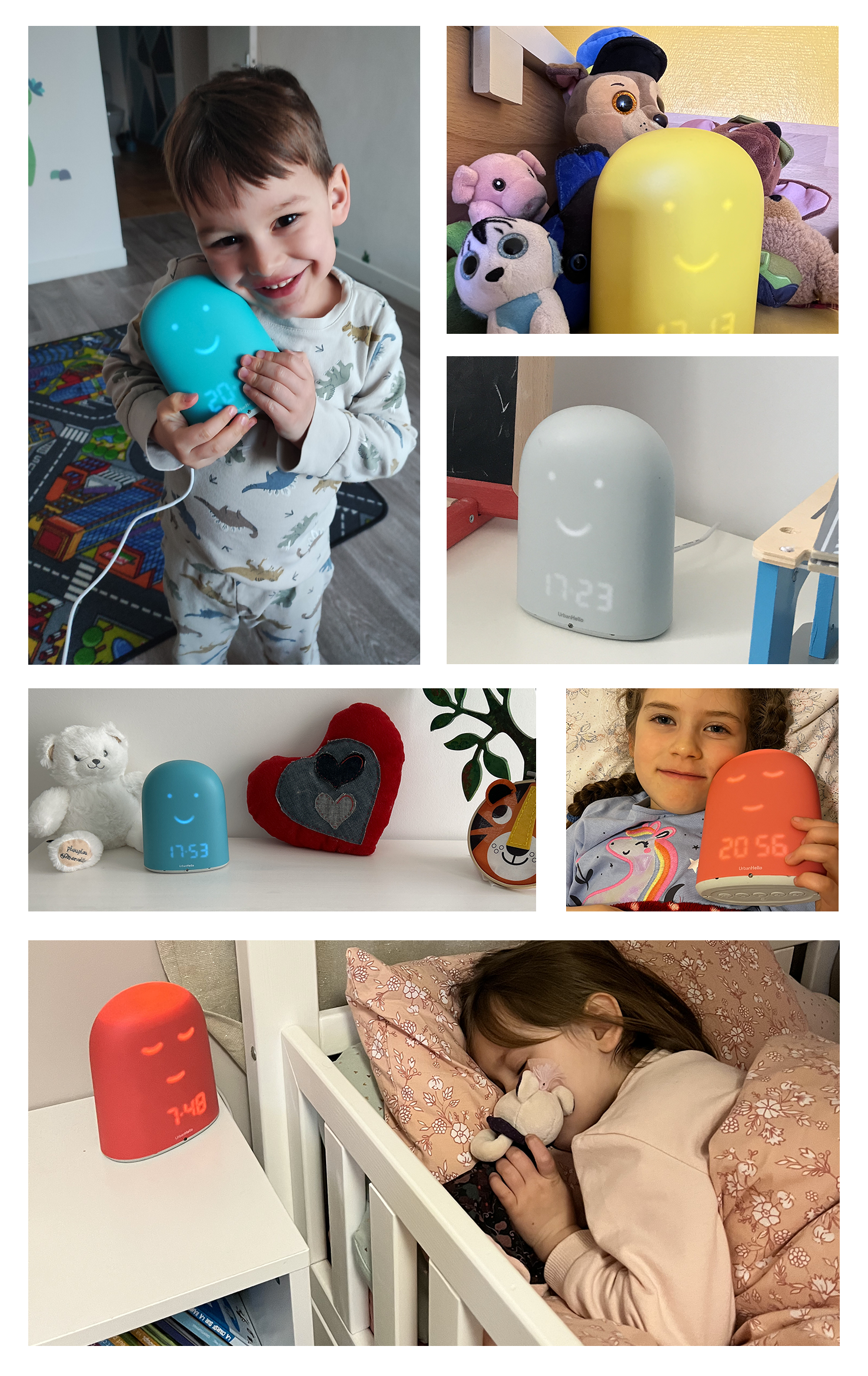1 Month Old Baby Sleep : Common Questions

After nine months of pregnancy, many parents imagine their baby will quickly settle into a sleep routine. But at just 1 month old, the reality is often quite different! The sleep of a 1-month-old baby is still highly irregular, which can understandably cause concern for new parents.
That’s perfectly normal—your baby is just beginning to discover the outside world, and everything is still so new! This crucial stage is often referred to as the fourth trimester. During these first few weeks of life, your little one is adjusting to being separated from the warm, comforting world of the womb.
This big transition can be unsettling. Your baby is still very attached to the sensations they experienced in utero: movement, warmth, and the familiar sounds of your body. That’s why your 1 month old baby not sleeping through the night—or waking up often—is completely normal at this stage.
And of course, it’s not always easy for parents—especially for Mum. The arrival of a newborn brings major hormonal changes, exhaustion, and the strong desire to help baby find some kind of rhythm. Rest assured, these moments are temporary , and there are simple ways to help your 1-month-old sleep better —while still respecting their unique needs.
Here are a few key points to help you understand your baby's sleep at 1 month and gently support them through this stage:
- Your baby needs to reconnect with familiar in-utero sensations: recreate a soothing environment by mimicking the sensations they experienced in the womb—white noise, gentle rocking, etc. Skin-to-skin contact and swaddling can work wonders for sleep!
- Day and night confusion is still normal: at this age, babies can’t yet distinguish day from night, but you can begin to guide them with soft, consistent cues.
- Mum needs rest too: after childbirth and the hormonal rollercoaster, it’s essential for Mum to care for herself and ask for help whenever possible.
- Babies need a lot of sleep, but it comes in short bursts of 3 to 4 hours at a time.
Don’t worry—every baby has their own rhythm and will gradually adapt to their new surroundings. Be patient and create a warm, calming environment so your little one feels safe and secure enough to sleep peacefully.
How much sleep does a 1-month-old baby need?
If you were hoping your little one would start sleeping through the night right away… you might need to hang in there a little longer. At this age, your baby sleeps a lot, but not in the way you might expect.
On average, a 1-month-old baby sleeps around 16 to 20 hours per day. Sounds like a dream, right? But here’s the catch—this sleep comes in short stretches. Your baby switches between sleep and wakefulness, usually in 3 to 4-hour cycles, both day and night. They're still too young to tell the difference between night and day, which can be exhausting for parents.
Here are the key things to know about baby sleep at 1 month:
- Baby sleeps around 16 to 20 hours a day, but spread out over short periods.
- Sleep cycles typically last 3 to 4 hours, with frequent wake-ups—often because baby is hungry.
- There’s no clear day-night rhythm yet; baby wakes based on basic needs like hunger, comfort, or just wanting a cuddle.
- Every baby is different! Some may sleep longer stretches, others wake more often. Each baby follows their own unique rhythm.
If your 1 month old baby is not sleeping through the night, don’t worry—it’s completely normal! These short nights won’t last forever. Gradually, your baby will begin to sleep longer stretches at night. For now, try to follow their rhythm, and don’t hesitate to nap when they do. Baby sleep evolves quickly, so patience—and plenty of cuddles—go a long way.
Your baby needs to reconnect with those in-utero sensations
At 1 month old, your baby is still in the middle of a major adjustment phase to life outside the womb. After spending 9 months warm, cozy, and surrounded by familiar sounds inside Mum’s belly, it’s perfectly normal for this transition to feel overwhelming.
To help your little one feel calm and sleep more peacefully, it’s important to recreate, as much as possible, the comforting sensations they experienced in the womb.
Here are a few simple tips that can truly make a difference!
As for swaddling, it gives baby that snug, secure sensation they remember from being gently held in the uterus. This cozy "cocoon" can help soothe your little one and make it easier for them to fall asleep.
One of the main reasons your 1 month old baby is not sleeping through the night is simply... hunger!
Whether you're breastfeeding or bottle-feeding, respond to their nutritional needs without stressing about frequent wake-ups. These night feeds aren’t just about food—they’re also powerful bonding moments. Baby feels safe and close to you, just like they did before birth.
Note: your baby already knows what they need, even in the first month. They’re perfectly capable of recognising how much milk they need and when. Trust your baby’s cues and feel confident practicing responsive or on-demand feeding.
If you’re bottle-feeding, it’s a good idea to offer small amounts regularly to support healthy digestion. On average, babies need around 8 bottles of 90ml per day (slightly less in the very first weeks).
Want to learn more? Check out our article: Exploring white noise for babies
Key features of a newborn's sleep
Naturally, baby sleep is very different from adult sleep.
Here are the essential things to know about the sleep of a 1-month-old baby:
While some babies (little sleep champions!) might snooze close to 20 hours a day, others may need just 14 hours to feel rested.
On average, a 1-month-old baby sleeps about 16 hours out of every 24.
At this stage, babies typically sleep for 3 to 4 hours at a time, followed by 30 to 60 minutes of wakefulness. This sleep pattern, common in the first months of life, is known as the “ultradian rhythm.”
Both phases are completely normal and play a vital role in your baby’s development.
Active sleep can be surprising for parents, as baby tends to move a lot: you might see grimaces, arm and leg movements, little noises—even briefly opened eyes. But don’t worry—your baby is still asleep. This phase is essential for healthy brain development.
Quiet sleep, on the other hand, is more restful: baby stays still, breathes steadily, and appears completely calm.
These two phases alternate every 50 to 60 minutes, making up a full sleep cycle. Understanding this rhythm can help you avoid waking your baby during active sleep—when they may seem restless, but are actually sleeping deeply.
Unlike adults, who fall asleep during a slow sleep phase, babies start with active sleep. As your baby drifts off, you may notice gentle movements of their fingers and toes, little stretches, limb twitches, yawns, soft grunts—even a red face! Their eyes may flicker under the eyelids, or briefly open for a few seconds.
However, if baby is truly awake and hungry, the signs will be clearer: full-body wriggling and wide-open eyes. It’s important to tell the difference—so you don’t accidentally wake your baby while they’re still peacefully sleeping.
Top priorities for your baby’s sleep at 1 month
Now that you know a bit more about 1-month-old baby sleep, here’s what to focus on to help your little one get the rest they need.
🌞 During the day, let the natural light in—open the curtains and brighten up your home and baby’s room.
By doing this, you help your baby’s body clock gradually adjust to a healthy circadian rhythm (day/night cycle). If your 1 month old baby is not sleeping well at night and seems to wake up often, it may be due to day/night confusion.
Important: Of course, never wake a sleeping baby—even during the day. They still need lots of rest!
These gentle moments will lay the foundation for healthy sleep habits in the months to come!
A simple bedtime routine for a 1-month-old might include a soft lullaby, followed by a moment of skin-to-skin contact or a gentle foot massage. Finish with a cuddle and a few whispered loving words before placing baby in their crib. At this age, the routine should last no more than 5 to 10 minutes.
The most common signs include frequent yawning, rubbing eyes, inconsolable crying, or staring off into space. Your baby might also become more irritable, make jerky movements, or start turning their head repeatedly.
These cues—sometimes subtle—are your baby’s way of saying they’re ready for sleep. Noticing them early can help you prepare for nap time or bedtime before your 1 month old baby not sleeping becomes a real struggle.
This simple measure can reduce the risk of sudden infant death by up to 76%. Lying on the back helps keep your baby’s airways clear and greatly lowers the risk of suffocation.
It’s also vital to maintain a safe sleep environment: the crib or bassinet should be completely free of loose items—no pillows, soft toys, blankets, or bumpers—until your baby can roll over on their own. These precautions help prevent suffocation risks and ensure your little one enjoys a safe and restful sleep, even if your 1 month old baby is not sleeping consistently just yet.
Common mistakes to avoid when managing sleep at 1 month
Now that you know more about 1-month-old baby sleep, here’s what to avoid to help your little one get the restful sleep they need.
If your baby yawns, makes little faces, or gently moves their arms and legs, it doesn’t necessarily mean they’re awake.
If they’ve truly finished sleeping or are hungry, their whole body will be more active and their eyes will be wide open.
In general, if you’re unsure whether your baby is really awake, chances are—they’re still sleeping!
For example, if the lullaby stops or you’re no longer nearby, your baby might start crying and enter a full wakeful state, making it harder to return to sleep. That’s why it’s important to keep the environment consistent between the moment they fall asleep and these micro-awakenings.
To put it into perspective—imagine drifting off at your desk after a long day, only to suddenly wake up in your bed. Confusing, right? It’s the same for your little one: falling asleep in your arms and waking up alone in the crib or a car seat can be just as unsettling for them!
Very often, your baby can drift back to sleep on their own—provided their environment feels stable and comforting.
Of course, it’s tempting to intervene as soon as your baby squirms or makes a sound, but giving them a moment to self-soothe can help them build valuable sleep skills.
This doesn’t mean they should never be comforted—but sometimes, a little pause can make all the difference. Trust your baby. They’re capable of more than you might think—and little by little, they’ll learn to fall asleep again without your help!
And finally, here’s our little bonus tip to support your 1-month-old baby’s sleep: nothing beats a gentle massage! We recommend two simple techniques.
👉 First, try an abdominal massage to support digestion. Place your hand on baby’s tummy, just below the belly button, and gently move in a clockwise circular motion.
👉 To help your baby relax and sleep better, you can also try foot reflexology. While Mum or Dad holds baby, the other can gently take baby’s foot and softly massage the big toe. Start by tracing the outline using your thumb and index finger with light pressure, then massage the inner part of the toe.
A wonderfully soothing moment for the whole family to share around baby!

Getting the nursery ready for your baby
Of course, good sleep starts with a well-prepared nursery. Here are the key safety rules to follow for a secure and peaceful sleep.
- Pay attention to the crib: It should meet current safety standards—avoid second-hand cribs made before 1986, as safety regulations have changed significantly. Even if the risk is low, your baby could get stuck between the bars. Avoid cribs without labels or instructions. The mattress should be firm, made of foam, and fit snugly in the crib to avoid any gaps where baby could get trapped.
- Check the room temperature: To sleep well, baby needs a room temperature around 20°C (68°F). Also, remember to air the room regularly.
- Avoid soft toys, duvets, or pillows during the first year. These items pose a suffocation risk. Consider getting a baby monitor or nightlight instead. Not only can they create a calming sleep environment, but they also help you keep an eye on baby throughout the night.
- Consider a smart baby monitor like REMI by UrbanHello, which lets you track your baby’s sleep directly from your smartphone!
The goal is to stay close to your baby at night while still providing a safe sleep environment.
According to the World Health Organization (WHO), room-sharing is recommended for up to 6 months to promote a secure and comforting environment for your baby. Here are some benefits of co-sleeping:
- Baby can smell your scent: This reassures them and helps them feel safe.
- Breastfeeding is easier: You can respond quickly to your baby’s needs, especially during night feeds.
- Added safety: Co-sleeping in the same room allows you to keep an eye on your baby and has been shown to reduce the risk of sudden infant death syndrome (SIDS), as long as safety guidelines are followed.

Frequently Asked Questions About Baby Sleep
From 2 months old, only 1 in 4 babies sleep through the night! This increases to 3 in 4 by the time they reach 4 months.
On average, most babies don’t consistently sleep through the night until between 6 and 8 months old.
To learn more, read our article: When will my baby sleep through the night?
In short, if your little one cries a lot in the evening, don’t worry—this is actually a sign of healthy development!
To learn more, read our article: Why does my baby cry in their sleep?
These phases typically last a few days to a few weeks. If you'd like to learn more about sleep regressions, check out our article: Everything you need to know about baby sleep regressions!
Discover REMI
THE SMART BABY MONITOR 😊
REMI and its app bring together everything you need to manage your baby’s sleep!
Its mission? Helping families sleep better — from birth up to age 10.
I bought REMI for my 4-year-old son who didn’t want to sleep alone anymore after his little sister was born. Thanks to the remote wake-up system and bedtime stories I can play from a distance, the issue is completely resolved! I 100% recommend this purchase!






 White noise for baby : a scientific research !
White noise for baby : a scientific research !
 What are the positive effects of napping on memory?
What are the positive effects of napping on memory?
 When do babies sleep through the night ? Tips and tricks !
When do babies sleep through the night ? Tips and tricks !
 Night terrors in babies: don't panic!
Night terrors in babies: don't panic!
 1 Month Old Baby Sleep : Common Questions
1 Month Old Baby Sleep : Common Questions